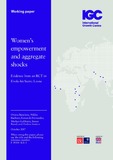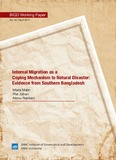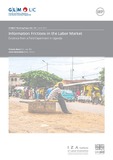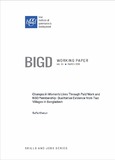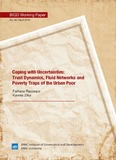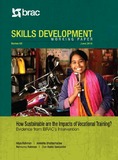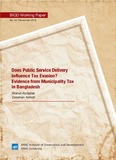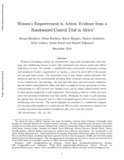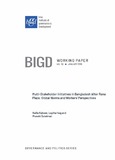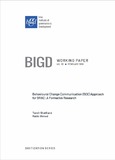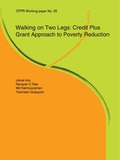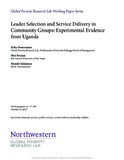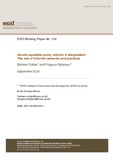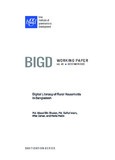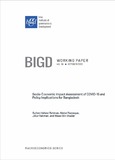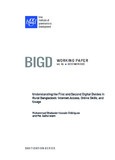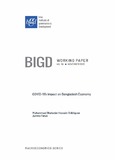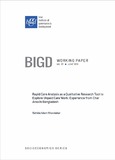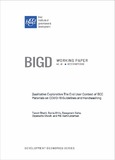Working Papers (Brac Institute of Governance and Development): Recent submissions
Now showing items 81-100 of 129
-
Women’s empowerment and aggregate shocks: Evidence from an RCT in Ebola-Hit Sierra Leone
(International Growth Centre, 2017-10)The condition of women in developing countries is characterized by low economic empowerment and limited agency over their body. This paper evaluates a policy intervention aimed at relaxing these constraints for adolescent ... -
Internal migration as a coping mechanism to natural disaster: Evidence from southern Bangladesh
(BRAC Institute of Governance and Development (BIGD), 2017-04)The study focuses on the impact of exposure to a natural disaster on migration. Here, we focus on a very specific type of migration where the households send household member(s) outside the community for earning purposes. ... -
Information frictions in the labor market: Evidence from a field experiment in Uganda
(Growth and Labour Markets in Low Income Countries Program, 2017-04)We study how a lack of information on the skills of workers affects both employers and job seekers. To do so, we design and implement a field experiment in the Ugandan labour market: through the provision of certifications, ... -
Changes in women’s lives through paid work and NGO membership: Qualitative evidence from two villages in Bangladesh
(BRAC Institute of Governance and Development (BIGD), 2019-03)Changing women’s lives through empowerment resources is important, but there are debates on how different resources of empowerment change women’s lives differently. Paid work is seen to be one of the major resources for ... -
Coping with uncertainties: Trust dynamics, fluid networks and poverty traps of the urban poor
(BRAC Institute of Governance and Development (BIGD), 2018-04)Over the recent decades, poverty has increasingly become more urbanized, driven partially by the large volume of rural to urban migration. The urban poor not only have to deal with living in overcrowded slums or other ... -
How sustainable are the impacts of vocational training?: Evidence from BRAC’s intervention
(BRAC Research and Evaluation Division, 2018-06)In Bangladesh, the school dropout rates at both the primary and secondary level are quite high. Majority of the school dropout children end up unemployed or in low-quality jobs. Hence, training programs can be a potential ... -
Training the disadvantaged youth and labour market outcomes: Evidence from a randomized controlled trial in Bangladesh
(BRAC Research and Evaluation Division, 2018-10)This paper estimates the effects of a youth training program in Bangladesh on labour market outcomes. The program provides on-the-job and classroom training to the disadvantaged and unemployed youth. On-the-job training ... -
Does public service delivery influence tax evasion? Evidence from municipality tax in Bangladesh
(BRAC Institute of Governance and Development (BIGD), 2018-11)This paper examines the role of access to public services on tax evasion. Establishing such a link directly (for both the citizens and researchers at the micro-level) is difficult because the tax collecting authority (Finance) ... -
Women’s empowerment in action: Evidence from a randomized control trial in Africa
(World Bank, 2018-12)Women in developing countries are disempowered relative to their contemporaries in developed countries. High youth unemployment and early marriage and childbearing interact to limit human capital investment and enforce ... -
Multi-Stakeholder initiatives in Bangladesh after Rana Plaza: Global norms and workers’ perspectives
(BRAC Institute of Governance and Development (BIGD), 2019-01)The collapse of the Rana Plaza building in Bangladesh in April, 2013 resulting in the death and injury of more than 2,000 workers from the country’s export garment industry was one of the worst industrial disasters in ... -
Behavioural Change Communication (BCC) approach for BRAC: A formative research
(BRAC Institute of Governance and Development (BIGD), 2019-02)As a part of social development, BRAC has been working in the Behavioural Change Communication (BCC) areas of its program participants for decades. Facing a revolutionary technological change, it is time to rethink the ... -
Walking on two legs: Credit plus grant approach to poverty reduction
(BRAC Research and Evaluation Division, 2017)There is a growing recognition that the ultra-poor are generally not integrated into the current anti-poverty programs. In this paper, we estimate the long-run impacts of a credit plus grant approach, a combination of ... -
Leader selection and service delivery in community groups: Experimental evidence from Uganda
(Global Poverty Research Lab Working Paper, 2017-10-31)In developing countries, NGOs and governments often rely on local community-based groups for the delivery of financial and public services. This paper provides causal evidence of how the design of rules used for group ... -
Gender equitable policy reforms in Bangladesh: The role of informal networks and practices
(Effective States and Inclusive Development Research Centre (ESID), 2020-09)The paper explores how power operates in a gendered manner and how informal processes shape possibilities for gender equity. It investigates how and why gender equality policies are formulated, when these may not be popular ... -
Digital Literacy of Rural Households in Bangladesh
(BRAC Institute of Governance and Development (BIGD), 2020-12)As more public and private sector services are being digitized to make them more accessible to citizens, digital literacy is becoming an increasingly essential skill needed to reap the fullest benefits from these services. ... -
Socio-Economic Impact Assessment of COVID-19 and Policy Implications for Bangladesh
(BRAC Institute of Governance and Development (BIGD), 2020-10)The COVID-19 pandemic is causing unprecedented health and economic crisis for global economies, including Bangladesh. The economic and social disruption caused by the pandemic as reflected in a massive loss of human life ... -
Understanding the First and Second Digital Divides in Rural Bangladesh
(BRAC Institute of Governance and Development (BIGD), 2020-12)Differences in individuals’ access to internet infrastructure refer to the first-level digital divide, whereas differences in an individual’s online skills and internet usage refer to the second-level digital divide. ... -
COVID-19’s Impact on Bangladesh Economy
(BRAC Institute of Governance and Development (BIGD), 2020-11)This BIGD study examines the impact of COVID-19’s impact on the major economic and financial indicators of the economy of Bangladesh, including production, wages, price levels, advances, bills, investments, remittances and ... -
Rapid care analysis as a Qualitative research tool to explore unpaid care work: Experience from char area in Bangladesh
(BRAC Institute of Governance and Development (BIGD), 2019-06)Every day unpaid care work is carried out all over the world and it is necessary for a society’s wellbeing. However, unpaid care work is largely ignored by economic and social public policy initiatives. Neither is it ... -
Qualitative exploration the end user context of BCC materials on COVID-19 guidelines and handwashing
(BRAC Institute of Governance and Development (BIGD), 2020-12)As a partner of the “Hygiene and Behaviour Change Coalition (HBCC),” BRAC Institute of Governance and Development (BIGD) initiated a rapid formative research to identify gaps in people’s existing hygiene knowledge and ...

